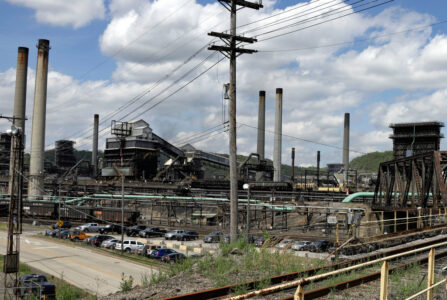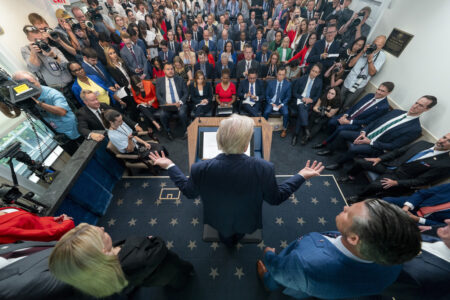Experts Agree: West Virginia Needs More Power

photo by: Derek Redd
John Scalzo, vice president of regulatory and finance for Appalachian Power, speaks about the future of energy in West Virginia on Monday at the West Virginia Manufacturing Energy Growth Summit at Oglebay Park Resort. Listening is West Virginia Public Service Commission Chair Charlotte Lane.
WHEELING — State lawmakers and utility companies agree — if West Virginia is going to move toward becoming an economic power, it’s going to need more electricity.
The topics of electrical deficits, data centers and microgrids all were among those discussed during the West Virginia Manufacturing Energy Growth summit Monday at Oglebay Park Resort’s Wilson Lodge. The event concludes today.
West Virginia Gov. Patrick Morrisey has signed into law House Bill 2014, which establishes the certified microgrid development program in the state.
It also encourages data centers to locate in West Virginia and generate their own power sources through microgrids.
West Virginia House of Delegates Speaker Roger Hanshaw, R-Clay; State Senate President Randy Smith, R-Preston; Sen. Glenn Jeffries, R-Putnam; and Bob Fehrenbacher, R-Wood discussed the importance of the bill during a legislative session.
Hanshaw said lawmakers realized companies wanting to invest in West Virginia have expectations for the kind of “power-generating possibilities their business model needs.”
“We wanted to be sensitive to that,” Hanshaw said. “We believe that HB 2014 is just a step toward that reality.”
Smith called the bill “possibly one of the biggest game changers for West Virginia,” and credited Jeffries for the effort he put behind the legislation.
He noted that the bill was passed on the Saturday that was the last night of the regular session, and that by Tuesday he and others were meeting with “five or six developers” interested in coming to West Virginia solely because of legislation having been approved.
Jeffries said it took teamwork to get the legislation passed.
“I think this bill will put West Virginia on the map,” he said.
Representatives for electric utility companies spoke during their session of how great the need is to increase power generation capacity in West Virginia and nearby states that belong to the “PJM,” the Pennsylvania, New Jersey and Maryland Connection for power resources.
Gary Jack serves as senior corporate counsel for Monongahela Power and Potomac Edison, subsidiaries of FirstEnergy.
He explained West Virginia is running short on “electrical capacity” — or the amount of electricity a generator can produce when it’s running at full blast.
Over the past five years, rates manufacturers pay for electricity have increased 50%, noted Derrick Williamson, managing member at Spilman, Thomas and Battle who deals with public utility and energy law at the firm’s Harrisburg, Pennsylvania office.
“There is an aging fleet of generation in West Virginia, and that is just a fact,” he said. “We have the initiative to pursue hypergrid development in West Virginia and this region.
“All of those things lead to the fact we’re going to have load growth and the need for more electricity, and we’re going to have to find more of a supply.”
Electric utility companies are going to have to find a way to produce more power, or buy it from other areas. Either way there will likely have to be an upgrade of electrical infrastructure, according to Williamson.
Also adding to the discussion on Monday were proponents of nuclear energy. Among those speaking were Juliann Edwards, chief development officer at The Nuclear Company, headquartered in Lexington, Kentucky.
“Nuclear power has to be in the epicenter for the long term,” she said. “But the only way to do that is to prove to other countries that we can actually build up nuclear in this country.”
Edwards said she spends a lot of time talking to countries who are interested in building nuclear power.
“They all see that we need an energy mix. We need coal. We need gas. We need renewables and nuclear power. But no other country trusts us with nuclear technology because we haven’t proven we can do it here on time and on budget,” she explained.
That has been happening in China and Russia, according to Edwards.






